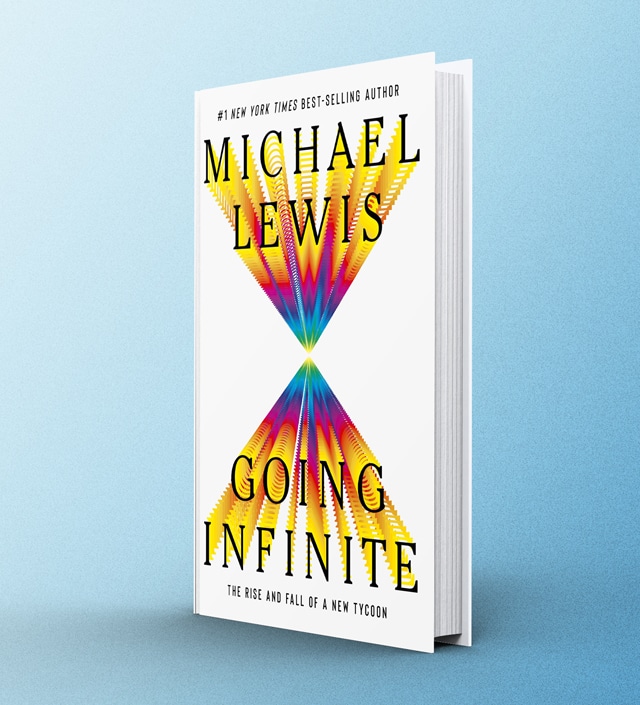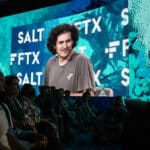Sam Bankman-Fried (known as SBF) was a bit odd; most said he was unknowable. Others said he had no empathy. He broke up with his girlfriend by memo.
Though filthy rich, he wore old wrinkled cargo shorts, tee shirts and sneakers, and insisted that his company condo, in the Bahamas, be the same size as those of his employees. He played the online video game “Storybook Brawl’’ in the wee hours, and seemed never to sleep. His work life was his social life.
Bankman-Fried is now on trial, accused of wire fraud, securities fraud and money laundering, to the tune of many billions of dollars. Acclaimed author Michael Lewis’s new book, “Going Infinite: The Rise and Fall of a New Tycoon,’’ was published the same day the trial began, Oct. 3.
The inside scoop
Lewis’s book is filled with details. For example, Bankman-Fried’s mother had to tell him, at age 31, what to wear for a court hearing last spring; he kept his childhood stuffed animal Manfred by his bedside, and he dismissed adults as consumed with pointless worry.
To me, Bankman-Fried seemed a combination of Howard Hughes and Chauncy Gardiner of the comedy-drama “Being There’’: To the world he was a vacant, distracted child-man hooked on the ephemeral world of gaming. By gaming, he’d amassed a fortune through the newest big thing: crypto-currency.
But his goal in making money was to give it away to make the world a more rational, peaceful, healthy place. He was a self-dubbed “effective altruist” and believed in utilitarianism.
Bankman-Fried’s colleagues and employees were slavishly and unwittingly loyal to him as they got rich, until the failed businesses wiped them out.
SBF’s short timeline
At 25, he founded his first company, a crypto quantitative trading hedge fund, Alameda Research, in November 2017, in Berkeley, Calif. In 2019, he moved Alameda to Hong Kong because regulatory rules there were easier on crypto-companies.
Shortly after the Alameda relocation, Bankman-Fried founded FTX, an exchange for buying and selling crypto-currencies.
FTX’s revenues grew from $20 million in 2019, to $100 million in 2020, to $1 billion in 2021. Forbes said SBF was worth $22.5 billion in November 2021.
But the Chinese government tightened regulatory rules on crypto currency in 2021, so Bankman-Fried moved the businesses to the Bahamas. Christine Rolle, executive director of the Securities Commission of The Bahamas, seeking income for the financially strapped country, was welcoming to crypto-currency companies. Sure enough, SBF spent hundreds of millions building a company compound.
Almost exactly five years later, on Nov. 10, 2022, the empire collapsed in bankruptcy.
Legal briefing
Prosecutors say Bankman-Fried funneled FTX customer funds to Alameda Research to make venture capital investments, buy real estate and donate to politicians.
He has pleaded not guilty and faces decades in prison if convicted.
His federal fraud trial is underway as Donald Trump’s New York State fraud trial is underway in courthouses about.02 of a mile from each other in downtown Manhattan.
Bankman-Fried once offered Trump $5 billion to not run for president.
A courtside companion
What’s nice about “Going Infinite” is that one can track the book’s reporting with the fraud trial’s contemporaneous revelations and testimony from Bankman-Fried’s inner circle, including the ex-girlfriend, who was CEO of Alameda Research.
The New York Times ran a story on Oct. 10, 2023 about the places that Bankman-Fried left behind, including Berkeley and the Bahamas. Lewis’s reporting, from last November, catches the eerie feel of the Bahamas business compound, deserted except for fleeing employees’ personal belongings, vast supplies of Chinese junk food and alcohol, and video and board games.
Lewis juices up about 100 pages of financial data, historical context and attempted explanations of what exactly crypto-currency is. Begging off, he recommends readers to “Matt Levine’s excellent forty-thousand-word article in Bloomberg, ‘The Crypto Story’” — with another 150 pages of anecdotes, insider stories and quotes from Bankman-Fried, such as:
- His parents were Stanford law professors who decided, with the agreement of their sons, Sam and Gabe, to stop celebrating birthdays and holidays; nobody missed them.
- Gabe said his brother spent his childhood and adolescence in his room, video gaming – mostly with the trading-card game “Magic: The Gathering.’’
- An Oxford University lecturer, who convinced Bankman-Fried of the appeal of earning to give, or “effective altruism,’’ said the concept appealed to a “demographic of a physics PhD program; the levels of autism ten time the average. Lots of people on the spectrum.’’
Still up for debate
Bankman-Fried “thought of himself as a thinking machine rather than a feeling one,’’ Lewis writes. He describes how SBF had to teach himself to make facial expressions, such as smiling or frowning, to show people he had “empathy.’’ And that Bankman-Fried told him that says feigning emotion was physically painful.
Lewis concludes that he’s not so sure Bankman-Fried willfully cheated people out of billions of dollars. Nor are people who knew him in the Bahamas (including Ms. Rolle and her assistant) or even colleagues who lost a fortune.
They attribute the collapse to SBF’s peculiar way of living and doing business.
Zane Tackett, a bitcoin pioneer and head of institutional sales for FTX, told Lewis that he hadn’t a clue the collapse was coming. “His oddness mixed with just how smart he was allowed you to wave away a lot of concerns. The question of why just goes away,’’ Tackett said.
Lewis digs deeper: He asks “Where’s the money?’’
Not all gone, it turns out. In a chapter called “The Vanishing,’’ Lewis writes that a bankruptcy investigation recovered hundreds of millions stolen by hackers; several banks and exchanges call to remind SBF’s lawyers that they have hundreds of millions, too. Who knows? Maybe more will show up. Will it be in time to affect the verdict?
Getting inside his head
As to the book’s title’s, in late 2021, Lewis asked SBF what he would sell the then-flourishing FTX for:
“’One hundred and fifty billion dollars,’’’ he finally said — though he added that he had use for ‘infinity dollars.’”
“(He) would use infinity dollars to address nuclear war, pandemics; artificial intelligence’s threat to mankind, and even more urgently, the assault on American democracy,’’ says Lewis.
And Bankman-Fried’s own outlook? “I’m broke and wearing an ankle monitor and one of the most hated people in the world,” he wrote in an unposted blog published by the New York Times. “There will probably never be anything I can do to make my lifetime impact net positive.’’
He added: “And the truth is that I did what I thought was right.”
“Going Infinite: The Rise and Fall of a New Tycoon’’ by Michael Lewis. W. W. Norton & Company. 255 pages. $30.
In a four-decade career in journalism, Eleanor O’Sullivan has reviewed many books on best practices for financial advisors, has written for Financial Advisor and the USA Today network, and was movie critic for the Asbury Park Press.







